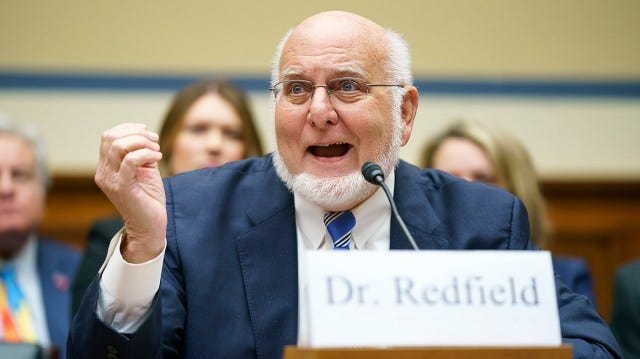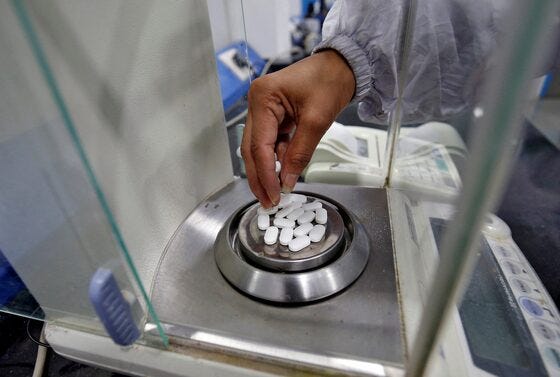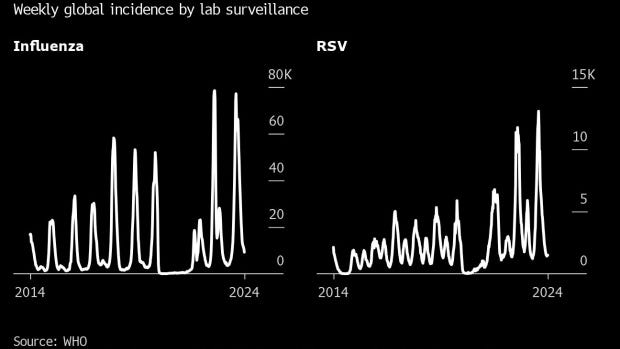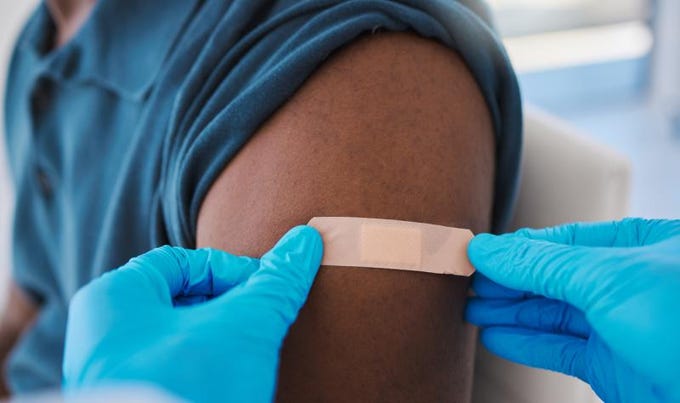You’re reading the web version of The Weekly Dose, our newsletter on health care and medical news. Sign up to get it next Sunday.
Hi Healthwatchers! 👩⚕️👨⚕️
Here’s our snapshot of stories from the week that are likely to have downstream impacts. You’ll probably want to be aware of these. Let’s begin with a bird flu update.
Ex-CDC director predicts H5N1 bird flu pandemic
Former CDC Director Robert Redfield expressed his concerns about a potential bird flu pandemic, emphasizing that whether one will occur is a question of when, not if.
Why it's important: Redfield, who served as CDC director during the first two years of the COVID pandemic, suspects H5N1 could have a human mortality rate of 25-50%. The overall estimated mortality rate for COVID sits at 0.66%.
The virus requires five specific amino acid changes to become capable of human-to-human transmission, a scenario Redfield warns is basically inevitable given the virus’ rising prevalence in other mammals. He also noted significant biosecurity risks, stating, “in 2012, against my recommendation, the scientists that did these experiments actually published them, so the recipe for how to make bird flu highly infectious for humans is already out there.”
Read more…
Quebec pharmacists association seeks class-action over ‘preferred pharmacy networks’
The industry group representing Quebec pharmacists is seeking authorization for a lawsuit against some of its own members, citing concerns over patients being directed to certain pharmacies to fill expensive specialty prescriptions.
Why it's important: This pesky PPN issue rears its head again, this time in Quebec. The outcome here could set precedent for the regulation of preferred pharmacy networks (PPNs) across Canada.
L’Association québécoise des pharmaciens propriétaires (the AQPP) argues that patient support programs are steering patients to specific pharmacies, resulting in roughly 40% of specialty drugs—seen as an essential element of a financially viable pharmacy—being distributed by just 0.5% of Quebec pharmacies. The AQPP argues that these practices violate industry ethics and provincial law guaranteeing patient choice.
Read more…
The global post-COVID illness surge has experts worried
The post-COVID world is witnessing a prolonged surge in infectious diseases surpassing pre-pandemic levels.
Why it's important: Post-viral host susceptibility, disrupted vaccine programs, climate change, social inequality, and strained healthcare systems are all contributors to this phenomenon.
The theory of 'immunity debt' is discussed, and promptly debunked. Some continue to adhere to the idea that individuals’ immune systems were rendered vulnerable by a lack of exposure to pathogens during 'lockdown' periods enacted over 4 years ago. Notably, jurisdictions which didn’t employ such restrictions are also seeing surges in illness, and rates of illness continue to spike in children under the age of 4, who weren’t alive yet in 2020.
Read more…
Alberta expands voucher program for home care
Alberta is expanding a program allowing eligible residents to hire private companies for home care services at the government's expense.
Why it's important: The program aims to provide more choice and flexibility for low-acuity patients, but critics point out that program providers aren’t subject to the same level of oversight as AHS contractors.
The program, known as ‘client-directed home care invoicing,’ started as a pilot in 2022 and lets patients use government vouchers to pay for home care services ranging from simple medication monitoring to basic chores. Supporters tout the model’s efficiency and argue that it frees up hospital resources, while opponents worry about a lack of standardized provider-training. Danielle Smith indicated the government might consider imposing accreditation for participating care providers.
Read more…
FDA changes COVID vaccine strain recommendation to match emerging variants
The FDA made a last-minute pivot on its fall COVID vaccine strain recommendation, favouring the KP.2 lineage over JN.1, which it had previously recommended less than two weeks prior.
Why it's important: The change aligns with the idea that vaccines should be matched not to the strain that’s currently dominating, but to the one that will be ascendant by the time the vaccines are actually available.
While mRNA vaccines can quickly be re-tooled to match evolving viral genetics, Novavax's protein-subunit vaccine (based on the older JN.1 strain) shows broad and durable protection, including against the newer KP variants. Interestingly, the FDA seems to be considering Novavax’s longer production timeline in determining its strain recommendations. This is presumably to avoid granting an unfair market advantage to mRNA-based vaccine makers.
Read more…
9/11 responders face dementia risk proportional to dust exposure
A new study reveals that 9/11 first responders exposed to particulate matter have a dramatically higher risk of early-onset dementia compared to the general population.
Why it's important: In light of emerging research pointing to the health risks of wildfire smoke, this one seemed timely. The study found that responders with severe exposure to dust and debris were nearly 40 times more likely to develop dementia.
Those using PPE were found to have significantly lower incidence rates, emphasizing the importance of proper safety measures in disaster and hazardous environments—like areas affected by wildfire smoke. This research adds to a growing body of evidence linking air pollution and dust exposure to neurodegenerative disease.
Read more...
And that's a wrap.
I’ve received a lot of feedback on the newsletter lately and am so glad people are seeing value in it. If you have anything to add to the conversation – suggested tweaks, stories, or an op-ed submission – just reach out to me. And if you have friends who want to stay in the loop, please do pass us on.
Thanks so much for reading. See you in a week!
Nick Tsergas
National Health News Editor
Canada Healthwatch
[email protected] | canadahealthwatch.ca





